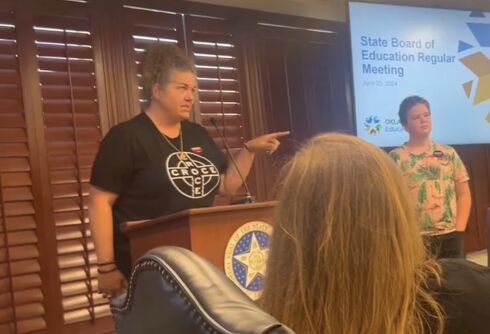Iowa’s Republican-dominated House Education Committee approved a controversial anti-trans bill Tuesday that includes troubling language reminiscent of the racist “separate but equal” legal doctrine.
House Study Bill 649, proposed by Gov. Kim Reynolds (R), would require the state to list both the sex a transgender person was assigned at birth and their gender identity on their updated birth certificate. The committee voted to remove a similar requirement for driver’s licenses on Tuesday, according to the Iowa Capital Dispatch.
Related:
Student yells “Trans rights are human rights” in front of Iowa’s anti-trans governor
“We’re not going to be protesting in a way that is comfortable for her that she can act like it doesn’t exist,” the transgender student said.
The bill defines terms like “sex,” “male,” and “female” according to reproductive anatomy and bans trans people from sex-segregated spaces like bathrooms, locker rooms, domestic violence shelters, and detention facilities that align with their gender identity.
Stay connected to your community
Connect with the issues and events that impact your community at home and beyond by subscribing to our newsletter.
It also states that “the term ‘equal’ does not mean ‘same’ or ‘identical’” and “Separate accommodations are not inherently unequal.”
During Tuesday’s subcommittee hearing, University of Iowa doctoral student Emma Denney compared the bill’s ID requirements to Nazis forcing LGBTQ+ people to wear pink triangles. “You are trying to do the same thing again here in Iowa by forcing trans people to have unique designations on our identification,” Denney told the committee. “Trans people already face overwhelming employment and housing discrimination in Iowa under existing law, and the governor’s bill would force us to out ourselves and open ourselves up to more violence anytime we have to show an identification.”
Pete McRoberts of the American Civil Liberties Union (ACLU) of Iowa argued that the ID requirements would violate privacy laws by forcing trans people who have received gender-affirming medical care to disclose their private healthcare information in any situation that might require them to show ID. He also noted that the ID requirement conflicts with a 2021 Iowa law that prevents people from having to disclose their COVID-19 vaccination status on government-issued identification.
“This is what you have to show to pick up groceries; this is what you show if you get pulled over,” McRoberts told the committee. “That personal information is there for one reason: to establish identity. The idea that a government-issued driver’s license would require somebody to display the most personal medical history is unconscionable.”
State Rep. Brooke Boden (R) argued that identifying trans people as such on their IDs would be vital in situations like traffic stops where police may have to incarcerate someone in a sex-segregated jail.
“What I hear from the trans community is that they are proud to be trans, and I guess that that would be OK to identify it as that and make sure that your birth certificate represents those things,” Boden said.
Echoing the false narrative that trans women pose a threat to cisgender women, supporters of the bill said that its ban on trans people accessing sex-segregated spaces that align with their gender identity is necessary to protect women. One survivor of domestic abuse suggested that banning trans women from women-only abuse shelters is necessary for women to have a safe place to recover.
But state Rep. Sharon Steckman (D) questioned whether actual shelters have reported problems with transgender women. As the Iowa Capital Dispatch notes, lobbyists for the Iowa Coalition Against Domestic Violence and Iowa Coalition Against Sexual Assault have opposed House Study Bill 649.
“I can’t see any other purposes than discrimination,” Steckman said. “Trans people account for 0.29% of our entire Iowa population. Somebody said this is an important bill — I can think of a million other things we should be doing besides going after 0.29% of our population.”
Steckman also asked bill supervisor state Rep. Heather Hora (R) to clarify the bill’s definition of “equal.”
“I would assume that equal would mean… I don’t know exactly in this context,” Hora said. “I would assume that they would have similar accommodations. Meaning, you know, if you wanted to use the female bathroom, you may not be able to use a female bathroom, but you can use a bathroom.”
Interfaith Alliance of Iowa executive director Connie Ryan compared the bill’s language to the Supreme Court’s 1896 decision in Plessy v. Ferguson, which upheld racial segregation and established the racist “separate but equal” doctrine. “Please stand on the side of history that always understands that separate is never equal, and equal under the law always matters,” Ryan implored.
Nevertheless, the committee voted 15-8 along party lines to advance the bill, which will now head to the Iowa House for a full vote.















